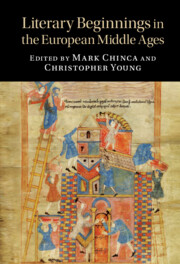Book contents
- Literary Beginnings in the European Middle Ages
- Cambridge Studies in Medieval Literature
- Literary Beginnings in the European Middle Ages
- Copyright page
- Contents
- Contributors
- Acknowledgments
- Foreword
- Chapter 1 Introduction
- Chapter 2 Scandinavia
- Chapter 3 Irish and Welsh
- Chapter 4 English
- Chapter 5 Spain
- Chapter 6 French
- Chapter 7 Dutch
- Chapter 8 Occitan
- Chapter 9 German
- Chapter 10 Italian
- Chapter 11 Czech and Croatian
- Chapter 12 Greek
- Chapter 13 East Slavonic
- Afterword
- Index
- Cambridge Studies in Medieval Literature
Chapter 12 - Greek
Published online by Cambridge University Press: 11 August 2022
- Literary Beginnings in the European Middle Ages
- Cambridge Studies in Medieval Literature
- Literary Beginnings in the European Middle Ages
- Copyright page
- Contents
- Contributors
- Acknowledgments
- Foreword
- Chapter 1 Introduction
- Chapter 2 Scandinavia
- Chapter 3 Irish and Welsh
- Chapter 4 English
- Chapter 5 Spain
- Chapter 6 French
- Chapter 7 Dutch
- Chapter 8 Occitan
- Chapter 9 German
- Chapter 10 Italian
- Chapter 11 Czech and Croatian
- Chapter 12 Greek
- Chapter 13 East Slavonic
- Afterword
- Index
- Cambridge Studies in Medieval Literature
Summary
Scholars since the nineteenth century have consistently divided Byzantine textual production into two distinct groups, ‘learned’ and ‘vernacular’, of which the latter was equated with the western vernaculars. The earliest longer texts in this ‘vernacular’ idiom appear in the twelfth century and became the beginning of Modern Greek (national) literature, while Byzantine ‘learned’ texts were left in a literary no-man’s land. The chapter criticizes this narrative by presenting and discussing the evidence from school practice in the twelfth century, where the vernacular idiom was part of learning Greek, and was used at the imperial court written by highly educated scholar-poets, such as Theodore Prodromos. In this sense, there was no beginning of Greek as vernacular in the twelfth century. Only in the later fourteenth century do we find a new textual production outside Byzantine territory that develops new forms of poetry including dialectal idioms. In this sense, vernacular Greek textual production does not have one beginning with a teleological ‘development’ towards the late fifteenth century and the end of Byzantium but, rather, two beginnings signalling two phases in the production of vernacular literature, one medieval and one early modern.
- Type
- Chapter
- Information
- Literary Beginnings in the European Middle Ages , pp. 255 - 275Publisher: Cambridge University PressPrint publication year: 2022
- 1
- Cited by

